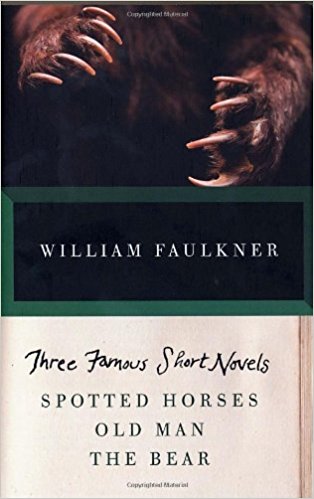I am a junior in college during the early 1980s, sitting attentively in Dr. Richard Predmore’s upper-level English course; I am an English education major, and the sort of mama’s-boy-student-suck-up that professors appreciated and fellow students wanted to throat punch.
Per the syllabus (a code I cracked with some embarrassment as a first-year student), we are in class that day to discuss William Faulkner’s “Spotted Horses,” a novella that Faulkner later integrated into the novel The Hamlet.

Dr. Predmore begins class by reading an extended passage, during which he can hardly restrain the grin on his face. He punctuates the reading with, “Isn’t that hilarious.”
•
That was almost 40 years ago, but I can still feel the blood running out of my head as I realized I had absolutely no idea what Dr. Predmore was talking about.
Funny? William Faulkner? The William Faulkner of “The Bear” from high school? The William Faulkner of the Nobel Prize acceptance speech?
Uncharacteristically, I said nothing the entire class period; I was mortified at my ignorance, and in typical nerd fashion, committed myself to re-reading “Spotted Horses” in a whole new light.
This embarrassing moment in my formal education came rushing back to me when a colleague posted on social media an interesting incident from one of her classes:
Second day of discussing Rape of the Lock, three minutes before the end of class, a student says, out of nowhere, in the voice of a person who has had a major revelation, “Wait, is this supposed to be funny?”
Not long before this posting, I had conducted my essay openings activity with first-year writing students using several openings from essays by Barbara Kingsolver.
As we unpacked those first paragraphs through reading like a writer activities (here and here), students struggled, as always, with identifying that Kingsolver in many of the essays incorporated craft creating humor to engage the reader.
And thus, my response to my colleague’s post offered these points:
(1) I was that student in college and it was about a Faulkner work, (2) I used to show Monty Python to my AP class early as a sort of starting point for which ones had developed linguistic sophistication, and (3) students have spent most of their formal education being incredibly serious about incredibly serious texts and topics, thus, we must help them over this hump.
Since my colleague’s post, I have walked through with my students Adrienne Rich’s “The Baldwin Stamp.” As we discussed Rich’s “We’ve come a long way from 1960; democracy, it seems, marches on,” followed by two extended passages from Baldwin, students again struggled with Rich’s tone, many thinking she made the statement in ernest, ignoring that her juxtaposing Baldwin’s sharp criticisms exposes her sarcasm.
As developing readers and writers, our students have been mostly underprepared in terms of reading and expressing tone, the delicate use of diction and a whole host of craft elements to guide readers through ideas.
Just as students are best served as emerging writers by writing, our students are best served as emerging sophisticated readers and thinkers by being allowed to experience and wrestle with a wide range of texts—not simply the seriously humorless texts that tend to be the bulk of what we read, and thus what we say in formal schooling.
More humor, then, is likely to benefit our students too often trapped in academic seriousness known as school.
About that, make no mistake, I am being entirely serious.

One thought on “The Very Seriously Humorless Education of Students”
Comments are closed.